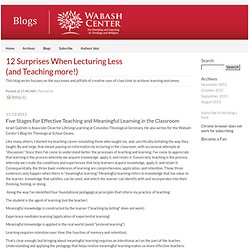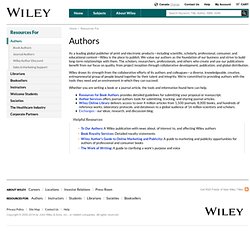

12 Surprises When Lecturing Less (and Teaching more!) Israel Galindo is Associate Dean for Lifelong Learning at Columbia Theological Seminary.

He also writes for the Wabash Center's Blog for Theological School Deans. Like many others, I started my teaching career emulating those who taught me, and, uncritically imitating the way they taught. By and large, that meant passing on information by lecturing in the classroom, with occasional attempts at "discussion. " Since then I've come to understand better the processes of teaching and learning. I've come to appreciate that learning is the process whereby we acquire knowledge, apply it, and retain it. Along the way I've identified four foundational pedagogical principles that inform my practice of teaching: The student is the agent of learning (not the teacher) Meaningful knowledge is constructed by the learner ("teaching by telling" does not work) Experience mediates learning (application of experiential learning) Meaningful knowledge is applied in the real world (avoid "pretend learning") 1. 2.
100 Steps by Dr. Ronda Chervin. Authors. As a leading global publisher of print and electronic products—including scientific, scholarly, professional, consumer, and educational content—Wiley is the place to publish.

We value our authors as the foundation of our business and strive to build long-term relationships with them. The scholars, researchers, professionals, and others who create and use our publications benefit from our focus on quality, from project inception through collaborative development, publication, and global distribution. Wiley draws its strength from the collaborative efforts of its authors and colleagues—a diverse, knowledgeable, creative, entrepreneurial group of people bound together by their talent and integrity. We’re committed to providing authors with the tools they need and an environment in which they can succeed.
Whether you are writing a book or a journal article, the tools and information found here can help. Helpful Resources. Blackwell Author Services. Rachel Held Evans - blog. So your response to Tuesday’s post was so kind and encouraging. Thank you. It really means the world to know I’m not alone, that many of us are wandering this religious wilderness together, taking it one step at a time. That said, this has been a painful few weeks, and I think I’ve felt some (self-inflicted) pressure to speak from that pain rather than listen to it. So I find myself second-guessing the “leaving evangelicalism” language, not because it’s an inaccurate representation of what I’m experiencing, but because I don’t want anyone to think for a moment that this means walking away from the many, many people who identify as evangelical whom I love and respect very much. I have no interest in breaking fellowship with my brothers and sisters in Christ, be they Catholic, Anglican, Lutheran, Methodist, Mennonite progressive or evangelical.
I guess I just convinced myself that if I let go of the investment I have in the evangelical community, this alienation wouldn’t hurt as much. Rach. Mouw’s Musings - The President’s Blog. April 17, 2013 My Economics Teacher, Bev Shea The news of George Beverly Shea’s death was not a shock for me–one expects that to happen fairly soon when a person reaches the age of 104. But I do feel a loss. I can’t remember a time when Bev Shea was not an important person in my world.
Well before he became known nationally and internationally as a prominent presence in Billy Graham’s evangelistic crusades, he was a household name in the New Jersey spiritual environs where I was raised–he sang regularly as a soloist in churches, at Bible conferences, and on local Christian radio programs. Our family bought our first record player when I was about five years old, and my memory is that the first record we purchased was of George Beverly Shea singing the favorites for which he was already well known.
Several decades later I made effective use of that early memorization on a public occasion when someone challenged me on a theological point. March 7, 2013. Roger E. Olson —